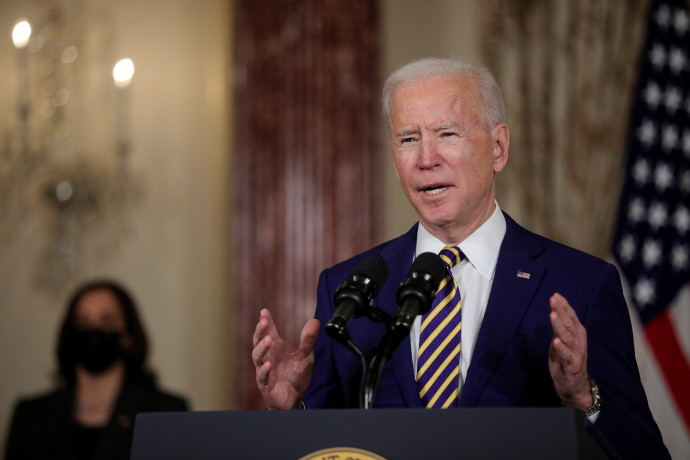5 Years after National Security Legislation, We Must Continue To Question Constitutionality
U.S. Secretary of State Antony Blinken and Secretary of Defense Lloyd Austin chose Japan as the destination for their first visit as members of President Joe Biden's Cabinet. This choice is very telling with respect to how difficult the situation is in the Asia-Pacific region at the moment. Foremost in this line of sight is none other than China's remarkable rise in military power.
Duty To Protect Expanding US Armed Forces
In a joint statement released on March 16 after a meeting of top security and foreign affairs officials from both the U.S. and Japan (a "two-plus-two" meeting), the two countries singled out and censured China, which has been strengthening its maritime expansion activities in the Pacific, and once again reaffirmed the "unwavering commitment of both countries to the Japan-U.S. Alliance."
Until now, the defensive cooperation between the JSDF and the U.S. military has continually grown more tightly knit in the form of the JSDF's expanding role.
Further reinforcing this trend, in September of 2015, Abe enacted the security-related legislation and then brought the laws to full force in 2016.
This close cooperative relationship between the JSDF and the U.S. military, which can be said to be akin to a "unification," is also apparent in the numbers. Over the past year, the JSDF saw an increase in operations to protect U.S. military assets such as ships and aircraft in accordance with national security laws, growing from 14 such missions in 2019 to 25 in 2020. This increase was the highest since operations began in 2017.
An itemized breakdown of operations shows that on four occasions, the JSDF escorted U.S. ships during intelligence gathering and observation missions (including monitoring of ballistic missiles), and on 21 occasions, it provided aircraft protection for joint exercises. From a legal perspective, although the security laws also target military operations other than the U.S. military, in the past five years, the JSDF has done nothing but protect U.S. military assets.
CNN reported that these missions in defense of U.S. military assets are "a sign of the growing integration of two of Asia's most powerful armed forces."
Triggering a Military Confrontation
Prior to enacting the national security laws, in peacetime, the JSDF's use of weapons was limited to only what was required to protect JSDF arms and facilities. However, after the laws went into effect, the scope of JSDF protection expanded to include assets and facilities belonging to the U.S. military and other foreign forces that "contributed to the defense of Japan."
However, no matter how much one can say that these activities contribute to Japan's defense, if an attack or intervention occurs during a U.S. protection mission, it is possible that the situation could trigger a military confrontation if the JSDF uses weapons to resolve the obstruction.
Moreover, without an announcement from the U.S. military regarding the timing and location of protection missions, information about the movements would be scarce to outside parties.
This scarcity of information comes despite former Prime Minister Abe's promise of freedom of information. In the National Diet's deliberations on the national security legislation, Abe remarked about the protection missions for U.S. ships. "In order to ensure accountability to the Diet and the citizens, we intend to disclose information to the maximum extent possible, with thorough explanations," Abe said.
When the draft bill was presented to the Diet, the Abe cabinet coercively reframed the interpretation of the concept of "right to collective self-defense" that successive cabinets had adhered to as unconstitutional based on the decision of one cabinet, and shifted to allowing additional defensive activities, in part.
Litigation claiming that these laws are unconstitutional has been raised in many areas, deservedly so.
Is the JSDF's ever expanding role under the security laws, including strengthening of its military equipment and integration with the U.S. military, compliant with Article 9 of the constitution, which calls for Japan to renounce war and refrain from preserving military power? Even now, five years after the legislation was enacted, we must continue to question its validity.
This year marks 30 years since the outbreak of the Gulf War, which was a turning point. Looking back, this war triggered the start of the JSDF's deployment overseas in the name of contributing to the international community, and with each subsequent international dispute, from the Iraq War to the war on terrorism, the JSDF's scope of action and duties has expanded.
Now, the confrontation is with China and its remarkable rise in military strength, but unlike previous disputes, China and Japan have an extremely close relationship, both geographically and economically.
If the U.S. and China come to a military confrontation in the area surrounding Japan, Japan probably will not emerge unscathed. The U.S. will likely seek further military cooperation from Japan, even beyond the current stipulations of the U.S.-Japan Security Treaty.
Only ‘Hard-Nosed’ Diplomacy
Of course, merely speaking about peace cannot actually maintain Japan's peace and stability, but on the contrary, wouldn’t continuing integration with the U.S. military lead down a rabbit hole of a "security dilemma?"
Another way to proceed is for Japan to fortify its defenses within the scope allowed by the constitution, while acknowledging the U.S. military as a regional police force, and sponsoring the U.S. military bases as a means to sincerely fulfill Japan's security treaty duties.
Furthermore, through dialogue with the heavily authoritarian China, we can uphold freedom, democracy and human rights, and urge China to fulfill its duties as a responsible member of the international community. We believe that it is necessary to formulate and boldly execute just such a diplomatic strategy.
Inciting antagonism and sticking to a containment policy is an ill-advised diplomatic and national security strategy.


